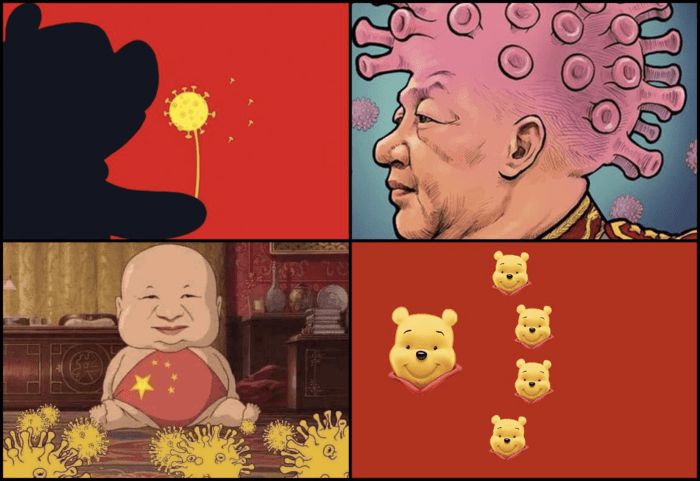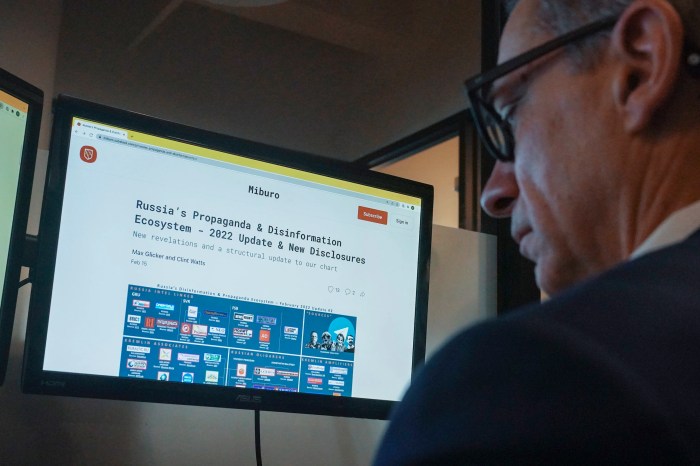
Perils of Preaching Nationalism Play Out on Chinese Social Media
The perils of preaching nationalism play out on Chinese social media, where a surge in nationalist sentiment has taken hold, fueled by political events, economic anxieties, and the very algorithms that shape our online experiences. This trend isn’t just a digital phenomenon; it’s a reflection of the complex forces shaping China’s domestic and international landscape.
We see it in the viral spread of patriotic content on platforms like Weibo and WeChat, where users share everything from fervent pronouncements of national pride to sometimes unsettling displays of xenophobia.
The rise of nationalism on Chinese social media isn’t just about expressing pride in one’s country. It’s about the potential consequences of unchecked nationalistic fervor. This essay will explore the dangers of excessive nationalism, the role of the Chinese government in shaping online discourse, and the impact on individual users caught in the crossfire.
We’ll also examine strategies for promoting critical thinking and fostering a more inclusive online environment.
The Rise of Nationalism on Chinese Social Media
The recent surge in nationalist sentiment on Chinese social media platforms is a notable phenomenon. It’s not just a trend; it’s a complex interplay of political events, economic conditions, and the very nature of social media algorithms. This rise has been fueled by a combination of factors, resulting in a landscape where nationalist content is increasingly prominent and influential.
Factors Contributing to the Rise of Nationalism
The rise of nationalism on Chinese social media is driven by a confluence of factors. These include:
- Political Events:Recent events like the trade war with the United States, the Hong Kong protests, and the ongoing territorial disputes in the South China Sea have amplified nationalistic sentiment. These events have fueled a sense of national pride and a desire to defend China’s interests on the global stage.
- Economic Conditions:China’s rapid economic growth in recent decades has instilled a sense of national confidence and pride among its citizens. However, economic anxieties, particularly among younger generations, have also contributed to nationalist sentiment. Some see a strong China as a solution to these anxieties.
- Social Media Algorithms:The algorithms used by platforms like Weibo and WeChat are designed to promote content that resonates with users, including content that reinforces existing beliefs. This can lead to the creation of echo chambers where users are primarily exposed to nationalist perspectives, further amplifying their beliefs.
Examples of Nationalist Content
Nationalist content on Chinese social media platforms often takes various forms. Here are some common examples:
- Propaganda and Patriotic Content:Content praising China’s achievements, highlighting its history, and promoting national pride is frequently shared. This includes official government messaging, but also user-generated content celebrating China’s economic progress, military strength, and cultural heritage.
- Anti-Western Sentiment:Content critical of the United States and other Western countries is common. This can include criticisms of Western policies, media coverage, and cultural influences.
- Nationalistic Memes and Slogans:Nationalist memes and slogans are often used to express strong emotions and rally support for China’s stance on various issues. These memes are frequently shared and adapted, spreading quickly through social media networks.
The Perils of Excessive Nationalism

While nationalism can foster a sense of unity and pride, its unchecked escalation can pose significant risks to Chinese society and its global standing. When nationalism becomes excessive, it can morph into a dangerous force, fueling intolerance, division, and potentially undermining the very values it seeks to uphold.
The perils of preaching nationalism are playing out on Chinese social media, where a wave of xenophobic sentiment has been amplified by government-backed influencers. This trend is mirrored by the news that the Biden administration is preparing for the end of free COVID-19 vaccines as funds run dry, a move that has sparked anxieties about accessibility and affordability.
While these issues may seem disparate, they both point to a broader global trend of rising nationalism and the potential for social and economic instability.
The Impact of Nationalism on Social Cohesion
Unbridled nationalism can contribute to a climate of xenophobia and intolerance, leading to social divisions and undermining the fabric of a diverse society.
The perils of preaching nationalism on Chinese social media are a stark reminder of the delicate balance between patriotism and free speech. While some may see it as a harmless expression of national pride, others view it as a dangerous form of propaganda.
It’s a complex issue, and one that highlights the importance of advice after quiet quitting here comes quiet firing – finding a healthy balance between personal beliefs and professional obligations. This is particularly relevant when it comes to navigating sensitive topics like nationalism, where the line between personal expression and potential consequences can be blurred.
- Increased prejudice and discrimination:Excessive nationalism can fuel prejudice against minority groups and foreigners, leading to discrimination and social exclusion. This can manifest in various forms, including hate speech, violence, and the marginalization of individuals based on their ethnicity, religion, or origin.
- Erosion of trust and dialogue:Nationalist rhetoric can polarize public opinion, making it difficult for people with different viewpoints to engage in constructive dialogue. This can lead to a breakdown of trust and understanding, hindering the ability to address societal challenges effectively.
- Suppression of dissent and criticism:In an environment of heightened nationalism, criticism of the government or its policies may be perceived as disloyal or even treasonous. This can stifle open debate and hinder the free flow of ideas, ultimately weakening the ability to address societal issues.
The Role of Government and Censorship

The Chinese government plays a pivotal role in shaping and controlling nationalist discourse on social media. Through a combination of content moderation policies, propaganda, and other strategies, the government aims to promote a specific narrative and suppress dissenting voices. This approach has profound implications for the development of Chinese nationalism and its impact on domestic and international affairs.
Content Moderation Policies
Content moderation policies are a cornerstone of the government’s strategy to manage online discourse. These policies aim to control the flow of information and prevent the spread of content deemed harmful or undesirable. Examples of such content include:
- Criticism of the government or its policies.
- Information that undermines national unity or territorial integrity.
- Content that promotes separatism or ethnic unrest.
- Calls for political reform or democratic change.
The Chinese government utilizes various methods to enforce these policies, including:
- Algorithms:Social media platforms employ algorithms to identify and flag potentially sensitive content. These algorithms are trained on datasets that reflect the government’s censorship guidelines.
- Human Moderators:Teams of human moderators are employed by social media companies to review flagged content and determine whether it violates platform rules or government regulations.
- Filtering:Specific s or phrases related to sensitive topics are blocked, preventing users from posting or searching for information on those subjects.
- Account Suspensions and Bans:Accounts that repeatedly violate content moderation policies can be suspended or permanently banned from social media platforms.
These measures effectively limit the scope of online discourse and ensure that the government’s narrative dominates the public sphere.
Propaganda and Narrative Control
The Chinese government employs propaganda to shape public opinion and promote its preferred narratives. This involves the dissemination of carefully crafted messages designed to evoke specific emotions and reinforce desired beliefs. Examples of propaganda techniques include:
- Nationalistic Rhetoric:The government frequently employs rhetoric that emphasizes national pride, historical grievances, and the threat posed by foreign powers. This helps to cultivate a sense of collective identity and mobilize public support for government policies.
- Patriotic Content:State-sponsored media outlets and social media accounts produce a steady stream of patriotic content, including documentaries, news articles, and social media posts. This content celebrates national achievements, glorifies historical figures, and reinforces the narrative of China’s rise as a global power.
- Selective Information:The government controls the flow of information, often suppressing news stories or perspectives that challenge its official narrative. This ensures that the public receives a curated version of events that aligns with the government’s agenda.
Propaganda plays a crucial role in shaping public perception and promoting nationalism. It serves to legitimize the government’s actions, mobilize public support for its policies, and foster a sense of national unity.
The perils of preaching nationalism play out on Chinese social media in ways that are both fascinating and concerning. It’s a reminder that even in a seemingly homogenous society, diverse opinions and perspectives exist. Sometimes, though, I just need a break from the heavy stuff and crave a bit of lightheartedness, like that “What I Eat in a Day” TikTok I saw recently.
It’s a reminder that there’s a whole world out there beyond the confines of online debates, and sometimes, a simple, relatable video about food can be a welcome escape. But even in those moments of escapism, it’s important to remember the complexities of the world we live in, including the dangers of unchecked nationalism.
Government-Sponsored Accounts and Influencers
The Chinese government utilizes a network of government-sponsored accounts and influencers to spread its messages and control the narrative on social media. These accounts are often disguised as independent entities, but they operate under the direction of the government.
- Official Accounts:Government ministries, agencies, and state-owned enterprises maintain official accounts on social media platforms. These accounts disseminate government announcements, policies, and propaganda materials.
- State-Controlled Media:State-controlled media outlets, such as Xinhua News Agency and CCTV, have a significant presence on social media. They publish news stories, editorials, and commentaries that reflect the government’s perspective on current events.
- Pro-Government Influencers:The government cultivates a network of pro-government influencers who promote its policies and narratives. These influencers often have large followings and can exert considerable influence on public opinion.
These government-sponsored accounts and influencers contribute to the spread of pro-government narratives and the suppression of dissenting voices. They create an echo chamber that reinforces the government’s preferred perspective and limits the diversity of opinions expressed on social media.
Comparison with Other Countries
The Chinese government’s approach to nationalism on social media is unique in its level of control and its use of propaganda. While other countries also engage in nationalist rhetoric and utilize social media for political purposes, the Chinese government’s approach is more systematic and comprehensive.
- Western Democracies:Western democracies generally have more open and diverse online environments, with fewer restrictions on free speech. While nationalist sentiment exists in these countries, it is typically not as tightly controlled or promoted by the government as it is in China.
- Authoritarian Regimes:Other authoritarian regimes, such as Russia and North Korea, also utilize social media to control information and promote nationalist narratives. However, the Chinese government’s approach is more sophisticated and technologically advanced, relying on advanced algorithms and a network of government-sponsored accounts.
The Chinese government’s approach to nationalism on social media reflects its authoritarian nature and its commitment to maintaining control over information and public opinion. It stands in stark contrast to the more open and diverse online environments found in many Western democracies.
The Impact on Individual Users: Perils Of Preaching Nationalism Play Out On Chinese Social Media

The rise of nationalism on Chinese social media has a profound impact on individual users, shaping their beliefs, attitudes, and behavior. This impact is multifaceted, ranging from the creation of online echo chambers to the spread of misinformation, and the psychological effects of constant exposure to nationalist rhetoric.
The Formation of Online Echo Chambers
Online echo chambers are a significant concern in the context of nationalism on Chinese social media. These are online spaces where users are primarily exposed to information and perspectives that reinforce their existing beliefs, often leading to the exclusion of diverse viewpoints.
- Algorithmic Filtering:Social media platforms, such as Weibo and WeChat, utilize algorithms to personalize content feeds, showing users information that aligns with their past interactions and preferences. This can inadvertently contribute to the formation of echo chambers by limiting exposure to contrasting opinions.
- Social Homophily:Users tend to connect with individuals who share similar beliefs and values, creating online communities where nationalist views are dominant. This can further reinforce existing biases and limit exposure to alternative perspectives.
- Confirmation Bias:Users are more likely to seek out and interpret information that confirms their existing beliefs, while dismissing or downplaying information that contradicts them. This cognitive bias can contribute to the reinforcement of nationalist sentiments within echo chambers.
The Spread of Misinformation, Perils of preaching nationalism play out on chinese social media
The proliferation of nationalist content on Chinese social media has facilitated the spread of misinformation, often presented as factual information or patriotic narratives.
- Lack of Critical Thinking:The constant exposure to nationalist rhetoric can hinder critical thinking skills, making users more susceptible to accepting information without proper scrutiny.
- Emotional Appeal:Nationalist content often appeals to emotions, such as pride and patriotism, which can override rational judgment and make users more receptive to misinformation.
- Lack of Independent Verification:The absence of independent sources and verification mechanisms within these echo chambers can contribute to the spread of misinformation.
The Psychological Effects of Constant Exposure to Nationalist Rhetoric
Constant exposure to nationalist rhetoric can have significant psychological effects on individual users.
- Increased Anxiety and Stress:The constant emphasis on threats and challenges from external forces can create a sense of anxiety and stress, leading to heightened vigilance and suspicion.
- Polarization and Intolerance:The reinforcement of nationalist beliefs can lead to increased polarization and intolerance towards opposing views, creating a hostile environment for dialogue and critical thinking.
- Dehumanization of Others:Nationalist rhetoric often portrays opposing groups as threats or enemies, contributing to the dehumanization of individuals and fostering negative stereotypes.
Strategies for Counteracting Nationalism
The rise of nationalism on Chinese social media poses a significant challenge to fostering a healthy and inclusive online environment. Counteracting harmful narratives requires a multifaceted approach that addresses the root causes of nationalist sentiment and promotes critical thinking skills among users.
This section will explore potential strategies for promoting critical thinking and challenging nationalist narratives on social media.
The Role of Education and Media Literacy
Education plays a crucial role in equipping individuals with the critical thinking skills necessary to navigate complex information landscapes. By promoting media literacy, individuals can learn to discern reliable sources from propaganda, identify biases, and critically evaluate information presented online.
A comprehensive education system should incorporate:
- Critical thinking skills development:Curricula should be designed to foster critical thinking skills, including analysis, evaluation, and synthesis of information. Students should be encouraged to question assumptions, identify biases, and consider multiple perspectives.
- Media literacy training:Integrating media literacy into the curriculum can help students understand how media shapes perceptions and influences opinions. They should learn to identify different types of media, evaluate their credibility, and recognize propaganda techniques.
- Digital citizenship education:Promoting digital citizenship fosters responsible online behavior, ethical use of technology, and respect for diverse perspectives. This includes teaching students about online safety, privacy, and the potential for misinformation.
The Importance of Diverse Voices
Exposure to diverse voices and perspectives is crucial for challenging nationalist narratives and fostering a more inclusive online environment. Social media platforms can play a role by:
- Promoting diverse content:Algorithms should be designed to promote content from a variety of sources and perspectives, rather than reinforcing echo chambers that amplify nationalist narratives.
- Encouraging cross-cultural engagement:Platforms can facilitate cross-cultural dialogue by creating spaces for users to connect with individuals from different backgrounds and perspectives. This can help break down stereotypes and foster understanding.
- Highlighting positive stories:Social media platforms should feature stories that celebrate diversity, tolerance, and cross-cultural understanding. This can help counterbalance the negative narratives often associated with nationalism.
A Hypothetical Campaign for Inclusivity
A hypothetical campaign aimed at fostering a more inclusive and tolerant online environment could focus on the following:
- “Beyond the Bubble”:This campaign could encourage users to step outside their online echo chambers and engage with content and perspectives that challenge their existing beliefs. It could feature stories of individuals who have overcome prejudice and built bridges between different communities.
- “Embrace Diversity”:This campaign could highlight the richness and beauty of diversity by showcasing the contributions of individuals from various cultural backgrounds. It could feature stories of individuals who have made positive impacts through their creativity, innovation, or community service.
- “Respect and Empathy”:This campaign could emphasize the importance of treating others with respect and empathy, regardless of their background or beliefs. It could feature stories of individuals who have shown compassion and understanding in challenging situations.






